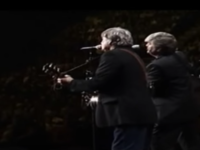At the Pabst Theater, Milwaukee, Wisconsin: The two words that repeatedly came to my mind during Lyle Lovett’s concert at the Pabst Theater on Saturday were “generosity” and “faith.”
This Texas native is the most generous of performers. He would not need to carry a backing band of over a dozen musicians with him on tour. That has to be expensive. He would not need to make certain that each musician is featured – either within a tune or with an individual selection. But Lovett does. And his generosity extends to the audience, presenting them with two-and-a-half hours of excellent music.
The generosity Lyle Lovett displays to those around him relates closely to the evening’s unmistakable theme of faith. Joining the Large Band for part of each concert is a gospel choir, selected from a church in the community where the band is performing.
After an instrumental “Blues Walk” that showcased the group’s piano, steel guitar, violin, acoustic bass, electric guitar, cello and four-piece horn section, frontman Lovett entered to sing three distinctively gospel-tinged selections: “I’m a Soldier in the Army of the Lord,” “I Will Rise Up,” and Lovett’s own “Church,” a song about making a preacher so hungry that he stops preaching.
The set list contained many crowd pleasers, including “She’s No Lady,” “Here I Am,” “North Dakota,” and “That’s Right (You’re Not From Texas).” Francine Reed was given her own vocal spotlight on “Wild Women Don’t Have the Blues,” and Luke Bulla played a fiddle tune, “The Temperance Reel,” with Lovett remaining on stage to observe in admiration. But in spite of some individual solo spots, this was a concert of ensemble performances. Drummer Russ Kunkel and acoustic bassist Viktor Krauss took few solos. They instead seemed to be featured constantly, providing tasteful and interesting rhythmic backing for this night of varied music.
Similar to performances by Dwight Yoakam, Lyle Lovett takes time during concerts to honor his own musical heritage. He spoke of the recent loss of Guy Clark, and recalled an acoustic show that he and Clark had played at this same venue. It seemed clear that the speaker was in awe of Guy Clark – as a musician, but also as a person. Stories of their friendship preceded Lovett’s performance of Clark’s most introspective number, “Step Inside This House.”
Later in the concert, Lovett described the importance of a favorite school principal who had recently died. Lovett’s cousin asked Lyle to sing “I’ll Fly Away” at the principal’s funeral. Initially crestfallen that one of his own songs had not been requested, Lovett complied. He told the audience he soon realized that – even in death – this man was teaching him new things, for Lovett needed to learn the chord changes to this song before playing it at the funeral.
If any somberness lingered after “I’ll Fly Away,” it was quickly dispelled. “Well,” said the performer, adjusting his capo to a very high fret, “We don’t do a lot of political songs, but we’ll do this one.” And with that, Lovett went into the opening finger-picking pattern of “If I Had a Boat,” one of his best loved (and decidedly apolitical) numbers.
As with the beginning of this concert, its conclusion also featured a trilogy of songs about faith. The gospel choir returned, and the combined 20-piece ensemble of singers and large band instrumentalists performed “I’m Gonna Wait ‘til My Savior Comes for Me,” “Praise the Lord, Hallelujah, Going to the Place,” and (as the encore) “Savior, Hear My Humble Cry.” As the Gospel Choir departed the stage for the last time, Lyle Lovett applauded and smiled, telling the audience: “And you can hear them again tomorrow morning at church!” It sounded to me like Lovett planned to be there.
- ‘Cold War Country,’ by Joseph M. Thompson: Books - December 2, 2024
- Acknowledging an Influence? Or Grounds for a Lawsuit? - August 9, 2024
- Dickey Betts’ Star Rose as the Allman Brothers Band Grieved - April 19, 2024



